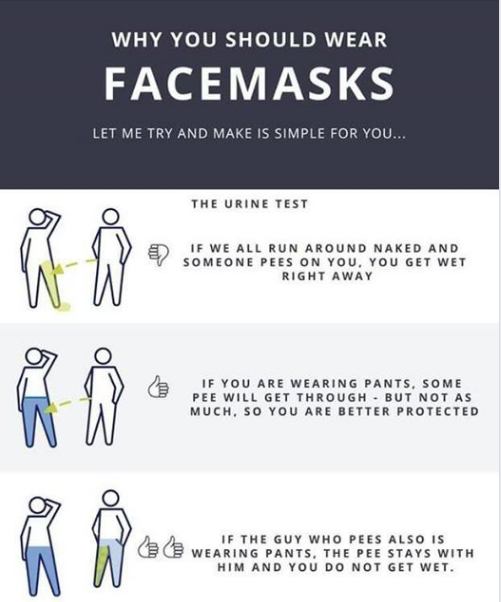Brits: What is our face-mask problem?
Social Distancing, Regular Handwashing, Face Masks, Bubbles: All these concepts of trying to reduce the spread of SARS-CoV-2.
Uptake in some has been slow; wearing a face-mask is not massively commonplace in the general public (unless it has been mandated as if you are using the public transport network); certain scenes of packed beaches have spread across news outlets and mass outrage has often followed by those who are calling it unfair and shameful; police-calling on neighbours and Facebook group posts about “whoever insert persons parent’s are should be ashamed for letting them outside to play and meet up”.
Why has facemask uptake been so slow?
I cannot recall a time when a health-care problem has affected the UK and been under all the following conditions:
- Not individualistic in nature - as in your current illness is something contained within your self. Most illness is personal in nature - that fact that you have an overactive thyroid does not spread to others - in a physical sense.
- A virus that is so easily spread, has a massive asymptomatic transmission but not a massive mortality rate and being slowly discovered to be in the general population
- The floor for catching it is simply being around someone - no specific, self-inflicted method of transfer. It is highly contagious with very little effort and there is still discussion around whether it can be carried on airborne particles.
H1N1 was close; I re-call massive poster campaigns at local doctor’s surgeries. Similarly, when Sars hit in 2003, there were similar levels of trying to educate the public, however, both diseases did not hit as far within the internal UK. No pattern of behavior of wearing a face-mask, regular distancing, cancelling of events was established as in these cases the disease was not on track for them to be needed.
After spending time in the People’s Republic of China where wearing a mask for colds and other minor ailments (along with not breathing int he thick smog in Beijing), using a face-mask is just a social standard. It is expected and they easily to hand. #
Face-masks as a style item and being “unfashionable“ is not even an idea I see as being worth consideration. As has been evident with treads of decorating them, videos of people covering them in makeup. I own a knitted patterned one, with the company being able to supply around 30 different designs.
Will face-masks for the common cold become a norm? I am not sure. Government has pushed them on public transport - as a legal requirement- and recommended, but it has not been as plastered as the “Stay at Home, Save Lives, Protect the NHS” slogan and it’s associated friends. The Royal Society and British Academy looked at the behavioural science of mask-wearing, stating that 25% of people in the UK wore masks in public places. This in stark comparison to 83% in Italy and 64% in Spain. I hope it would, but who knows.
Face-masks are a vital part of being safe outside when you have to mix with others. I’ll leave you with my favourite infographic, so far, around why wearing a mask makes sense. (I did have to use it to explain to someone why it is worth it but that is another story).